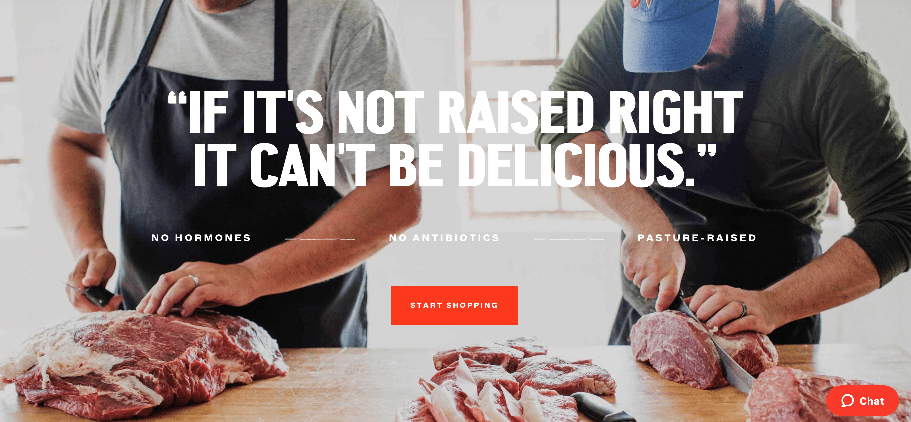Chris Carter and James Peisker had a major beef with the meat industry working in Nashville’s restaurant and catering scene. The pair were committed to sourcing and serving all of their foods directly from the farm, but were spending long hours in the car looking for high quality, ethically farmed meats. Even when they found nearby farmers they wanted to buy from, they still had their doubts that the processing facilities were giving them the meats they had ordered.
“We figured it we were having this problem, consumers were having twice that,” Carter told AFN.
They decided the only way to know for sure what they were serving people was to take control of the supply chain. The partners opened up their own farmer’s stand, then the Porter Road butcher shop in Nashville, and bought a slaughterhouse in neighboring Kentucky. In 2017, Carter and Peisker launched their butcher operation online, making fresh, sustainably-reared (and not frozen) meats available to customers across the US.
Porter Road’s growth beyond its hometown of Nashville has been enabled by $3.7 million in venture funding it raised last year. The company wants to eventually serve customers more locally than it does now, rather than shipping its products long distances. It will look to replicate its Nashville-Princeton, Ky. model by acquiring additional slaughter facilities and building partnerships with local farmers in other parts of the country.
As Americans were enjoying the $875 million of meat they bought for the July 4th holiday, Carter talked with AFN about the challenges of being the “first and only” whole animal butcher shop, customer loyalty, and being pro-meat amid the vegan protein craze.
“First and only” high-end butcher shop. There must have been challenges to being first, right?
Every single bank in town laughed at us—no one could understand why we were going to open a high-end butcher shop in East Nashville. So we ended up first launching first as a farmer’s market stand at the East Nashville Farmer’s Market, which we called Porter Road, because that was the road I lived on when we came up with this plan.
We raised the money from our own funds, from [my] catering business, from the farmer’s market and family and eventually opened the shop. We had $500 in the bank, two hogs and half a beef.
We grew to 15 employees who were learning how to butcher, making fresh sausages, and then we knew the next logical step was to go slaughterhouse shopping.
You bought your own slaughtering facility in Princeton, Kentucky to have complete control over what happens to the meat you sell after it leaves the farm. Porter Road’s customers no doubt value that. But is it possible to scale Porter Road’s model without compromising any of that control and oversight?
We purchased our Princeton facility six years ago. Then, it was barely trucking along, because the community had lost so much of its local agriculture [to factory farming]. Now we run it with 40 employees operating five days a week. We pay good wages, employees get a 401(k). Four of them bought houses last year. Its one of the most sought-after jobs in the community.
There are a lot of facilities like Princeton that are barely making it or will have to close their doors. So we can do the same thing we did in Princeton, and replicate somewhere else. (Comparatively) shipping fresh meat across the country on a flight is very expensive. Being more local also minimizes the carbon footprint.
Most of the meat people buy in the US still comes from factory farms. What are the main obstacles to converting those customers and getting them to think about consuming meat more consciously?
You see it happening naturally. People are becoming more conscious of what they’re eating. Every time Netflix puts out a new documentary on the meat industry, consumer education gets stronger. That’s the way it should be.
Still, a big driver is price. We talk a lot about the “real cost of food.” An 89-cent pound of turkey shouldn’t be a real thing. People should be asking, “Why does this cost so little?”
At the opposite end of the spectrum, “vegan meat” is all the rage right now, and some of the popular brands have been very outspoken about their mission to get people to stop eating animal meat entirely. Should that be the real goal, in the end, to making our food system more sustainable and humane?
Not everyone eats meat. (My wife doesn’t.) But trying to get everyone to stop eating animals isn’t the way to correct everything that’s wrong in agriculture.
The zoomed in lens of the meat industry [exposes] all of the bad stuff. But if we point fingers at meat as a whole, we’re all going to lose. Whether its [Porter Road] or plant-based or lab-grown meat, we’re all trying to fix what’s wrong with the system and change the way the industry is run.
There is a right way [to raise meat]. Keep cows on the pasture, let them graze as they naturally would, revitalize agriculture in communities that have had so much taken away from them—give control back to the farmer.
We work with this farmer in Kentucky. He was a row cropper, primarily raising genetically modified crops, farming in a way that sucked all of the nutrients out of the earth. Now he uses the land for livestock grazing. The only corn and soy he grows is to make feed, outside of the natural grasses they eat, and all of it is non-GMO. And now the land is healthier.
“Regenerative agriculture” is a buzzy new term, but we did it this way 60, 70 years ago, before we started trying to commoditize everything. It can be done that way again.
This interview has been slightly edited for length and clarity.





